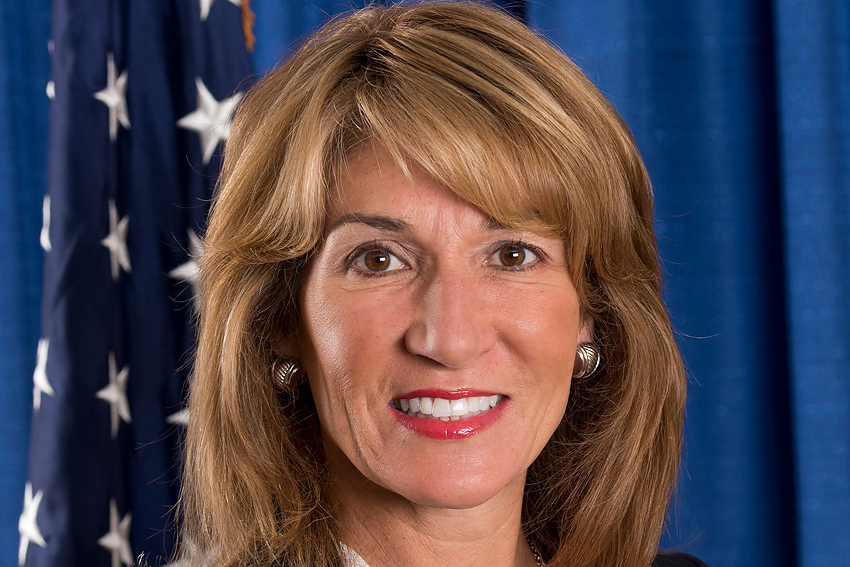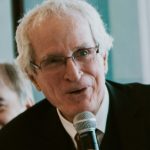Massachusetts Lieutenant Governor Karyn Polito (in photo) spoke about her experiences in politics at BC Law on January 29. The BC Law Republicans student group that sponsored her visit saw it as an opportunity to learn about effective policymaking as a Republican in a Blue state.
A graduate of Boston College, Polito began her public service as selectwoman in her hometown of Shrewsbury and many years later, in 2015, became the Commonwealth’s 72nd lieutenant governor. She chairs the Community Compact Cabinet, which seeks to elevate the administration’s local partnerships, and the Seaport Economic Council, which helps coastal communities leverage their unique assets to drive sustainable regional growth.
Preventing sexual assault and domestic violence have been priorities for Polito throughout her public life, and she now serves as chair of the Governor’s Council to Address Sexual Assault and Domestic Violence. Under her leadership, the Council has assessed the implementation of the Commonwealth’s domestic violence laws, as well as launched working groups in five priority areas, including child trafficking and prevention education in schools and universities. She also serves as co-chair of the STEM Advisory Council, and works to ensure that all students have access to comprehensive Science, Technology, Engineering, and Math (STEM) education.
Giving Social Justice a Chance: A lawyer, a social worker, and a human resources administrator stressed the value of cross-cultural collaborations in achieving social justice during a panel discussion at BC Law on February 6. BC Law Dean Vincent Rougeau said that justice goes beyond the individual and must be viewed in the context of community, where “a lot can be transformed in relationship.” BC social work professor Rocio Calvo argued that social inequities are a construct and that as such they are fixable by systemic change. Her weapon of choice in that fight? Facts. “You have to use evidence based on knowledge” to do it right, she said. David Trainor, vice president for human resources at Boston College, emphasized the importance of acceptance, not homogenization, in building a just society. The speakers also explored ways to ferret out bias—in a supportive classroom environment, for example—so that people can learn to look at themselves and others in a more understanding way. The panelists—and questioners in the audience—suggested that getting away from the “I” and looking at things objectively, enables learning. As one attendee put it, “If we’re going to live in a pluralist society, we have to give people the space to speak” and not react as though we’re being attached personally. Tracey West, associate dean for External Relations, Diversity and Inclusion, moderated the discussion, which was sponsored by the Black Faculty Staff and Administrators Association.
Examining Federalism Anew: The role of state attorneys general in the Trump era was the subject of a January 30 Rappaport Center for Law and Public Policy panel on the “New Federalism.” Panelists discussed how states are taking affirmative steps to protect the rights of citizens under state laws while engaging in collaborative initiatives, in certain areas, with federal agencies. The panelists were James E. Tierney, lecturer at Harvard Law School and former Maine Attorney General; Mary Strother, first assistant attorney general in the Massachusetts AG’s office; and Duke Law School’s Ernest Young, a leading authority on the constitutional law of federalism. Tom Barnico ’80, director of BC Law’s Attorney General Clinical Program since 1989, moderated. The event was held at the BC Club in Boston.
Scholarly and Career Conversations: Former Boston College visiting professor Fr. Grzegorz Zielinski spoke on religious freedom in Europe at a Law School event January 31. A Polish priest, Fr. Zielinski studied Canon Law and Civil Law at the Institute of Utroque Iure at the Pontifical Lateran University in Rome. In 2013, he received the Licentiate degree in those specialties and in 2016 received his doctorate and completed his thesis: “The Right to Freedom of Belief: A Conceptual Framework.” He was a visitor at BC from 2014 to 2016. Among the scholars presenting works-in-progress at the regular Faculty Colloquium were corporate compliance scholar Veronica Root of Notre Dame Law, Zahr Said of University of Washington (on jury instruction in copyright law), and Jared Ellias of Hastings Law (on executive compensation). Sidd Pattanayak, assistant general counsel at TripAdvisor, spoke to students at a Career Services event.





